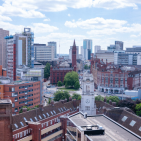On the 19th July, in the heart of Birmingham, Handsworth Park played host to the Simmer Down Festival, which saw some of the UK’s biggest reggae artists fill the area with velvet tones and positive messages. Asian World had the privilege of interviewing Surj Sahota (lead singer of the Sahota’s) who added their own twist on Reggae by combining it with Punjabi music.
When you first started singing, was it something you were serious about turning into a career or was it just a hobby?
It started when we were back at school. We loved music since we were children. We entered a competition called school proms, and we happened to win it for the whole of England. That led to us playing at the Royal Albert Hall and then we got a record deal straight away. Music was always in our family. We have been blessed. I believe God put me here, he knew my true want in life and that was singing. I have five brothers and we are all musicians. We dropped our first record which was bhangra, then we infused reggae with bhangra, and it just took us to great heights.
How did the idea of infusing Punjabi music and reggae start? How was it developed?
(Laughs) As a child I used to listen to a lot of Bob Marley and Burning Spear. I was very inspired by them, I started studying reggae music and realised the tempo works with bhangra (laughs) the skank blended nicely with the bhangra rhythm. We brought it around the world, and we had loads of Indian people asking us “What’s that music you’re playing” – and we told them: “That is reggae music you zimmie!” (Laughs). Bhangra never worked with Jazz, it was too confusing, but bhangra and reggae is sunshine music, it helps you to feel good.
Because The Sahota’s were one of the first British Asian Bands to go mainstream, what were some of the pressures you faced?
Back in our day, our parents wanted us to be a barrister or a doctor (laughs) so when I said I wanted to be a musician they clipped me around m’ear! (Laughs) The Indian philosophy is that you need to get a good job, but music was always in us, it’s a feeling as well as a career. We had to prove that we were the best, our songs ended up being number one in the bhangra charts, so the family knew we were taking music seriously. Our parents were alright after that (laughs).
You’ve been to a lot of countries around the world, but which country gave you the best response to your music and why do you feel that happened?
That’s a good question – I think every country has a different culture, so that can influence whether they really feel the music, but I loved Nairobi, Kenya. The response we had out there was amazing, they loved the reggae and the bhangra fusion, but there’s so many memories from so many countries, it’s a great thing to have
You’ve gone solo to establish your own music career, what were your reasons for wanting to branch out?
I love my brothers, and I am sad that they’re not with me today, but we’ve had a ten year break. My brothers got married, commitments start taking precedent rather than the music, it sort of slowed them down, but I was still free in a sense. The fans were asking me to bring the music back so for the love of my fans, and I really do love them, I kept the music alive, that’s what it’s all about. I’m just doing my best (laughs).
What’s next for you?
I’m working on my new single right now, and I have a few tours in Malaysia, but I’ll be taking reggae music all around the world for sure (laughs).




















